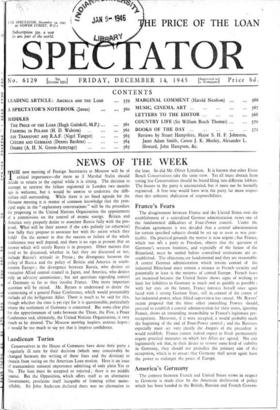France's Fears
The disagreement between France and the United States over the establishment of a centralised German administration raises one of the fundamental difficulties of Four-Power control. Under the Potsdam agreements it was decided that a central administration for certain specified subjects should be set up as soon as was prac- ticable. On practical grounds the matter is now urgent ; but France, which was not a party to Potsdam, objects that the question of Germany's western frontiers, and especially of the future of the Rhineland, must be settled before centralised institutions are re- established. The objections are fundamental and they are reasonable. A central German administration which retains control of the industrial Rhineland must remain a menace to French security and potentially at least is the mistress of central Europe. French fears are increased because the United States shows signs of wishing to limit her liabilities in Germany as much and as quickly as possible ; with her eyes on the future, France foresees herself once again faced with a strong German State, still in control of the centre of her industrial power, when Allied supervisicn has ceased. Mr. Byrnes' recent proposal that the three other controlling Powers should, proceed to establish a central administration for their zones, ignoring France, shows an astounding insensibility to France's legitimate pre- occupations. Moreover, if it were accepted, it would probably mark the beginning of the end of Four-Power control ; and the Russians especially must see very dearly the dangers of the precedent it would establish. France cannot indeed expect to block permanently urgent practical measures on which her Allies are agreed. She can legitimately ask that, in their desire to restore some kind of stability in Germany, they should not prejudice the primary aim of the occupation, which is to ensure that Germany shall never again have the power to endanger the peace of Europe.


























